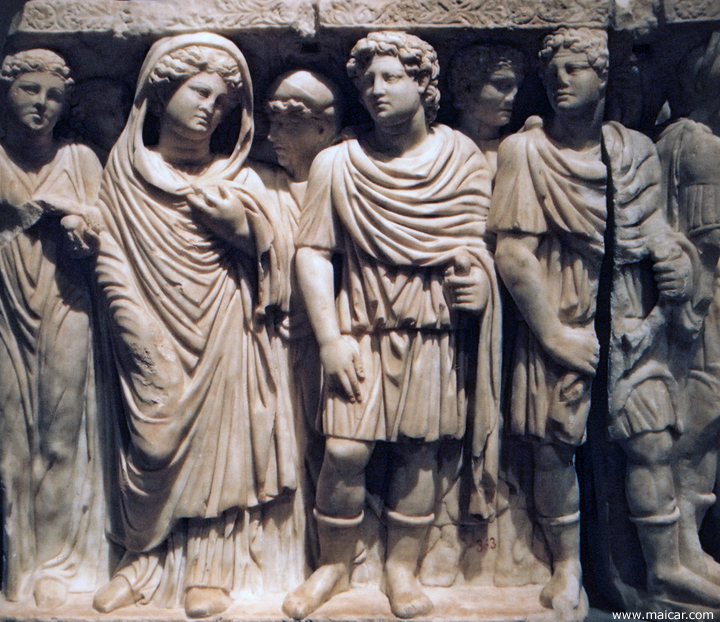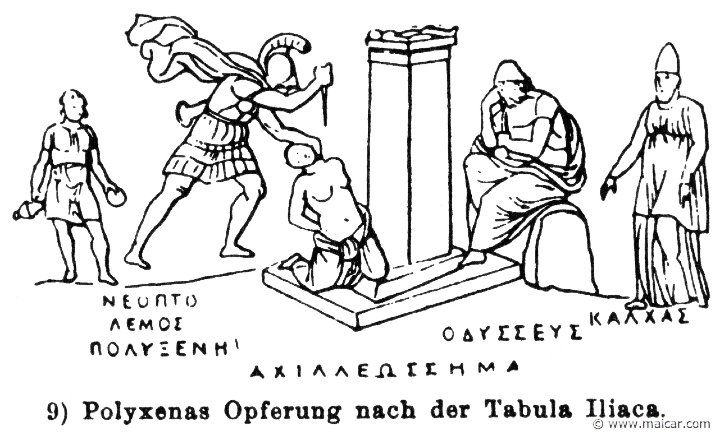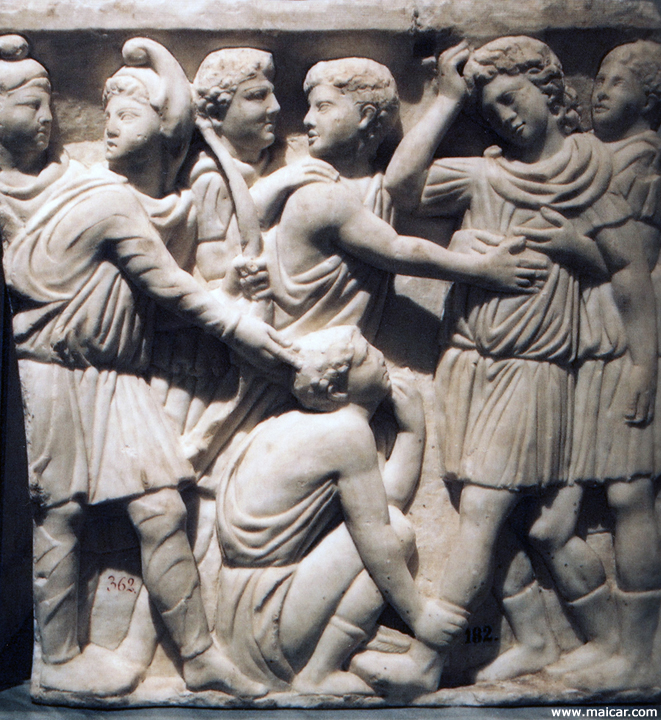|

|
Polyxena 1 on her way to be sacrificed. Neoptolemus walks at her side. 9927: Políxena y Neoptólemo. Sarcófago con la historia de Aquiles y Políxena. Siglo III d.C. Museo Nacional del Prado.
|
|
|
"One unaccustomed to the taste of misery bears it, but suffers as his neck accepts the yoke. For such a one there is more happiness in dying than living. For life bereft of honor is toil and trouble." (Polyxena 1 to Hecabe 1. Euripides, Hecabe 375).
"For your unhappiness I weep with plaintive wail, mother; but for my own life, its ruin and its outrage, never a tear I shed; no, death has become to me a happier lot than life." (Polyxena 1 to his mother. Eur.Hec.214).
"Odysseus, I see you hiding your right hand beneath your robe and turning away your face, so that I may not touch your beard. Take heart; you are safe from the suppliant's god in my case, for I will follow you, both because I must and because it is my wish to die; for if I were unwilling, a coward would I show myself, a woman faint of heart." (Polyxena 1 to Odysseus. Eur.Hec.342).
|
|
Several pictures show how Achilles attacked Polyxena 1 (the Trojan princess, daughter of Priam 1 and Hecabe 1) and her
brother Troilus, as they
approached a well—he to let his horses drink,
she to fetch water. Of both, only the girl escapes.
It is on this occasion that Achilles kills Troilus (whether at the
beginning of the war or near its end). Troy having been burned down, the Achaeans sacrifice Polyxena 1 at the tomb of Achilles (Proclus, Chrestomathia, ii; Apd.Ep.5.23;
Eur.Tro.622; QS.14.267ff., 14.323ff.,
Try.686, etc.). Pictures show Neoptolemus taking
her to the tomb, or, already in place, sacrificing
her.
"The Achaeans
then poured the blood of Polyxena over the tomb of
dead Achilles to propitiate his wrath." (Tryphiodorus 686).
When Troy had fallen,
the Achaean herald Talthybius came to see Queen Hecabe 1 to inform her
of the victors' decision concerning the members of
the Royal family (Eur.Tro.249): That Cassandra had been
assigned to Agamemnon, Andromache to Neoptolemus, and the
queen herself to Odysseus. Questioned by Hecabe 1 on the fate of her daughter Polyxena 1, the herald answered:
"She is made
ministrant to Achilles tomb." (Eur.Tro.263)
That was bad enough for the queen ("a sepulchre's servant"). So
she asked details about the custom and its statute,
being then reassured by Talthybius:
"Count thy
child happy. It is well with her...She has found
her fate—deliverance from troubles." (Eur.Tro.263)
Only later she understands the meaning of the
herald's words, when she learns from Andromache that Polyxena 1 had been slain at Achilles' tomb:
"Thy child is
dead, a gift to a lifeless corpse." (Eur.Tro.622)
It was Achilles' ghost who demanded Polyxena 1 be sacrificed. The earth and sea trembled, the woods resounded with crashing, the valley rent asunder, and in the middle of these and other portents (which the herald Talthybius narrates in Seneca's Troades 170ff.), forth leaped the mighty shade of Achilles,
filling the shore with an enraged shout:
"Let Polyxena,
once pledged to me, be sacrificed to my dust by the
hand of Pyrrhus (Neoptolemus) and bedew my tomb." (Seneca, Troades 195).
In this variant, Agamemnon and Neoptolemus discussed the ghost's orders. All commanders had
received their share of the spoils, but (reasons Neoptolemus) Achilles, who had made Troy totter got nothing.
And how could Agamemnon, who had
immolated his own daughter Iphigenia at Aulis,
think it cruel to sacrifice Priam 1's daughter to Achilles? Even if the
girl were from Hellas, argues Neoptolemus, Agamemnon should
yield, being as he is "Achilles' debtor". Agamemnon protests
with packages of wisdom such as "Ungoverned violence is a fault of
youth", "Ungoverned
power no one can long retain", "Fortune has raised and exalted the
might of man", etc. He does not wish to be
guilty of "cruel
bloodshed" which could besides "besmirch the noble shade" of Achilles. He is
afraid of falling into arrogance, of being too
bold. He is now tired of being "haughty", his pride is "broken". He wishes to
be a worthy leader:
"Should I
count sovereignty anything but a name bedecked with
empty glamour, a brow adorned with a lying
coronet?" (Seneca, Troades 271).
He enjoys playing the role of the magnanimous
man:
"All that can
survive of ruined Troy let it survive; enough and more of
punishment has been exacted." (Seneca, Troades 285).
And he insists that he "will not permit" the
killing of the royal maid since the blame falls
upon him. And he closes his speech with a high
allegation of conscience:
"...he who,
when he may, forbids not sin, commands it." (Seneca, Troades 291).
|

|
Neoptolemus killing Polyxena 1. To the right, Odysseus and Calchas. R3-670b: Sacrifice of Polyxena. Polyxenas Opferung nach der Tabula Iliaca. Roscher, 1884.
|
|
The reward of Achilles, he argues,
shall be his fame and the songs of praise: "Save your father from scorn and
hate", he recommends the reluctant Neoptolemus. Human
victims cannot honor human dead, he means. Neoptolemus now discovers that there is pride in wisdom, and that it is easy to be wise in prosperity. He is not persuaded. It is then that Calchas—the same
seer behind the sacrifice of Iphigenia—makes
his entrance (Seneca, Troades 360). Not only he recommends that Polyxena 1 be sacrificed ("...let Pyrrhus (Neoptolemus) lead his father's bride to
him."), but also that little Astyanax 2 (the son of Hector 1) be
killed ("from the high
watch-tower let him fall ... and let him perish
there"). Little Astyanax 2 was murdered either by "the Achaeans" (Apd.Ep.5.23;
Ov.Met.13.415; Pau.10.25.9;
Hyg.Fab.109; Eur.And.10;
Eur.Tro.725ff., 1121; QS.13.251), or by Neoptolemus (LI.14), or by Odysseus (SI.1;
Try.645). In Seneca, Troades 1100, Odysseus fetches the
boy and leads him to a tower from which the boy, "of his own will",
leaped down. Even the Achaeans wept for this crime.
Yet they made themselves ready for a new one:
Polyxena 1 is fetched for her "wedding". A wedding, however, which was to take place not on earth but in the Elysian fields, and with a dead man—Achilles. "O hand of Paris, too light!", laments Hecabe 1, since Achilles, though dead, still proves deadly (Seneca, Troades 956).
At the sight of both Achaeans and Trojans, Polyxena 1, dressed like a bride, is slaughtered by Neoptolemus upon his father's tomb.
"The dauntless maid did not shrink back, but facing the stroke, stood there with stern look and corageous. A spirit so bold strike the hearts of all ..." (Seneca, Troades 1150).
It has also been said that Achilles' ghost appeared before his son to ask for the sacrifice:
"Be Priam's daughter Polyxena led—
Whom as my portion of the spoil I claim—
And sacrificed thereon: else shall my wrath
Against them (the Achaeans) more than for Briseis burn." (QS.14.214).
In this variant, the Achaeans lead the maid, not as a bride, but as herdmen drag a calf (—257), and like a calf moans so wailed she, and "down streamed her tears". In the past, Hecabe 1 had a dream on these events
"Herseemed that on Achilles' tomb she stood
Moaning, her hair down-streaming to the ground,
And from her breasts blood dripped to earth the while,
And drenched the tomb." (QS.14.273).
which she only understands on the day when Neoptolemus plunged his blade into her daughter's throat. The corpse of the girl was afterwards taken to the house of Antenor 1 for burial. She had lived in the house of Antenor 1 since the idea was to marry her to his son Eurymachus 3 (QS.14.323). Now, the reason for this "wedding" in the afterlife is to be found in Achilles' love for Polyxena 1 (if not in plain madness). Achilles had sought her in marriage, and having come to a meeting, he was treacherously murdered by Paris and Deiphobus 1—two famous jewels of the Trojan royal family (Hyg.Fab.110).
During a truce (so Dictys 3.2ff.), Achilles and some of his men came to watch the ceremonies of the Trojan women and how they prayed to Apollo. Hecabe 1, Cassandra and Polyxena 1 were among them. It was then that Achilles discovered Polyxena 1, being struck by her beauty. From that moment, Achilles became the prey of his own passion, and after several days of torment, he sent Automedon (his charioteer from Scyros) to meet Hector 1 and plead his suit for the girl. Hector 1 demanded a political agreement in exchange for his sister. So Achilles promised to bring the war to an end if he was given the girl as wife. Hector 1 was not satisfied with promises: he demanded an oath and the lives of certain Achaeans. Such demands unleashed the wrath of Achilles, who decided to kill Hector 1 as soon the truce was over. On second thoughts, however, he started to ponder how far he should go in meeting Hector 1's demands. He did not ponder in a calm way, but he was violently disturbed. So Automedon, fearing that something could happen, revealed everything to Patroclus 1 and Ajax 1 so that they would keep an eye on Achilles. But Achilles came to his senses by himself, and told Agamemnon and Menelaus about his love for Polyxena 1 and his dealings with the enemy. The Atrides told him not to worry, that soon enough Troy would be defeated and the girl would be his anyway.
Those were not false hopes. Soon was Hector 1 dead, and Priam 1 and Andromache came to Achilles' tent as suppliants to ransom the body (Dictys 3.20). Andromache had brought with her little Astyanax 2 and another son, Laodamas. And along with Priam 1 and Andromache came also Polyxena 1, who fell at Achilles' feet and promised to be his slave if he would return the body of Hector 1 (3.24). From the offered Trojan treasures, Achilles kept the gold and silver, and the clothes he liked best, and what was left he gave to Polyxena 1, handing over Hector 1's body to Priam 1. Then Priam 1, fearing the future might bring utter defeat, begged Achilles to keep Polyxena 1 for himself. For the moment Achilles answered that she should return to the city, but that they would talk about her again at a later occasion, and in another place (3.27).
Some time later, a truce was observed during the festival of Thymbraean Apollo. On this occasion, Priam 1 sent word to Achilles through the herald Idaeus 1 with instructions regarding Polyxena 1 (4.10). While Achilles and the herald were in a grove examining the instructions, they were observed by some Achaeans, and word of the meeting was brought to the ships. Fearing treason, Ajax 1, Diomedes 2, and Odysseus went to the grove to keep an eye on the secret dealings, and stayed in front of Apollo's temple, waiting for Achilles to leave. Meanwhile, Paris and Deiphobus 1 approached the unarmed Achilles as if to confirm his agreement with the Trojan king. Deiphobus 1 then embraced Achilles, congratulating him for the terms of the agreement, and as he hanged upon him, Paris rushed forward, thrusting two blows in Achilles' sides with his sword. And when they saw him dying, they left the place in haste, having thus broken the truce and stained with blood the temple of Apollo (4.11). At the fall of Troy, Polyxena 1 was given to Neoptolemus to be sacrificed on his father's tomb at the request of Odysseus (5.13).
Dares 27 says, however, that Achilles saw Polyxena 1 for the first time, when she and her parents visited the tomb of Hector 1 on the first anniversary of his funeral. Being struck by love's disease, he sent word to Hecabe 1, via a Phrygian slave, that if she would give him Polyxena 1, he would return home with his army of Myrmidons. The slave returned with an affirmative answer, provided Priam 1 also agreed. But Priam 1 was only ready to give his consent if the Achaeans departed, and lasting peace were agreed with sacred oaths. Achilles then began to play the role of peace-maker, saying that so many thousands had died for one single woman, and that the army should return home. War continued, however, and Palamedes (who now was commander in chief after Agamemnon was deposed) slew Deiphobus 1, before he himself was killed by Paris (28). Otherwise, Palamedes is said to have been accused of treason through the machinations of Odysseus, and stoned to death by the Achaeans (Apd.Ep.3.8, 6.8; Hyg.Fab.105; Pau.10.31.2; QS.5.198).
|

|
Death of Achilles (second from the right); he has already been wounded in the ankle. Paris (wearing a Phrygian cap) is seen holding his bow. 9926: Sarcófago con la historia de Aquiles y Políxena. Siglo III d.C. Museo Nacional del Prado.
|
|
During a truce, an embassy (Odysseus, Nestor, and Diomedes 2) was sent to ask Achilles to reenter the fighting, but he refused and answered that, because of his love for Polyxena 1, he would fight "rather poorly" (Dares 29). In the meantime, the Trojans were led by Troilus and Paris, and as Troilus obtained several victories, Achilles decided to return to the battlefield, where he succeeded in killing Troilus.
Bewailing the loss of her sons, Hecabe 1 decided to avenge the deaths of Hector 1 and Troilus. In Priam 1's name, she summoned Achilles to come to the temple of Thymbraean Apollo "to settle an agreement according to which she would give him Polyxena to marry". Paris then gathered a number among the bravest Trojans and stationed them in the temple to wait for his signal. The next day, when Achilles arrived to the temple together with Antilochus (the son of Nestor), they were immediately attacked from all sides. Paris killed first Antilochus, and then Achilles (34). Otherwise, Antilochus is said to have been killed either by Memnon (Apd.Ep.5.3; Hyg.Fab.112; AETH.1; QS.2.256), or by Hector 1 (Hyg.Fab.113; Pau.3.19.12).
While Troy was being plundered, Hecabe 1 fled with Polyxena 1, whom she entrusted to Aeneas, who in turn concealed her at the home of Anchises 1, his father (41). Later, when the time for sailing back home arrived, Neoptolemus remembered that Polyxena 1 had not been found in the palace (where he himself had cut down Priam 1 at the altar of Zeus). He complained that the cause of his father's death had not yet been found, and demanded that Agamemnon produce her. Agamemnon summoned Antenor 1 (who had betrayed the city), and ordered him to find the girl. Having met Aeneas (who had opened the gates to the Achaeans), Antenor 1 asked him to hand over Polyxena 1. Aeneas then gave her to Antenor 1, who gave her to Agamemnon, who gave her to Neoptolemus, who cut her throat upon his father's tomb (43).
Frazer (footnote Apd.Ep.5.4a) writes: "... the Second Vatican Mythographer tells us that Achilles first saw Polyxena, Hector's sister, when she stood on a tower in the act of throwing down bracelets and earrings with which to ransom Hector's body, and that when Achilles came to the temple of the Thymbraean Apollo to ratify the treaty of marriage and peace, Paris lurked behind the image of the god and shot the confiding hero with an arrow ..."
Others have said that Polyxena 1 was in love with Achilles, and that their love was mutual. According to Favius Philostratus (c. AD 170 onwards), Apollonius of Tyana (perhaps 1st. century AD) asked Achilles' ghost five questions, one of which concerned Polyxena 1. Was she slaughtered on his tomb? Yes, but
" ... she came of her own free will to the sepulchre and ... so high was the value she set on her own passion for him and his for her, that she threw herself upon an upright sword." (Apollonius. Life of Apollonius of Tyana 4.16).
So he said, but it is difficult to ascertain if the dead tell the truth more often than the living.
|